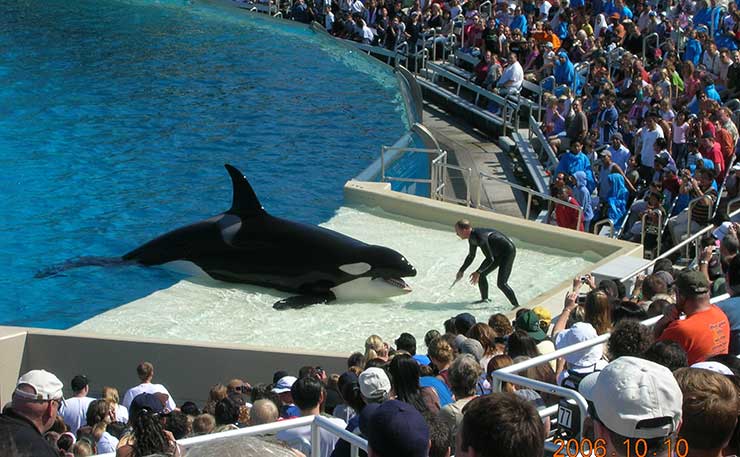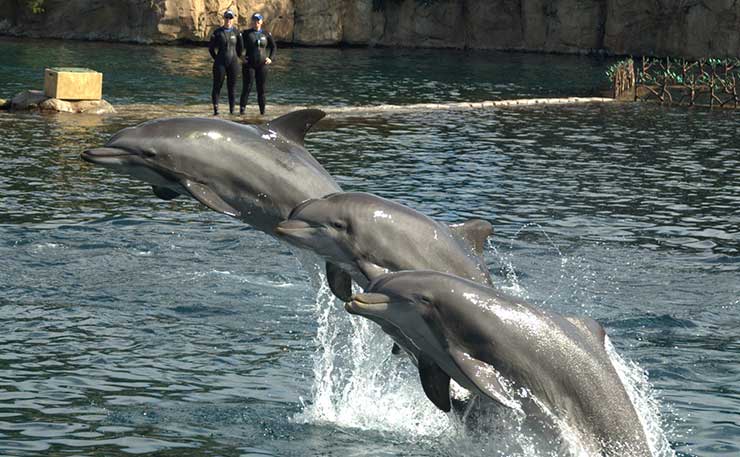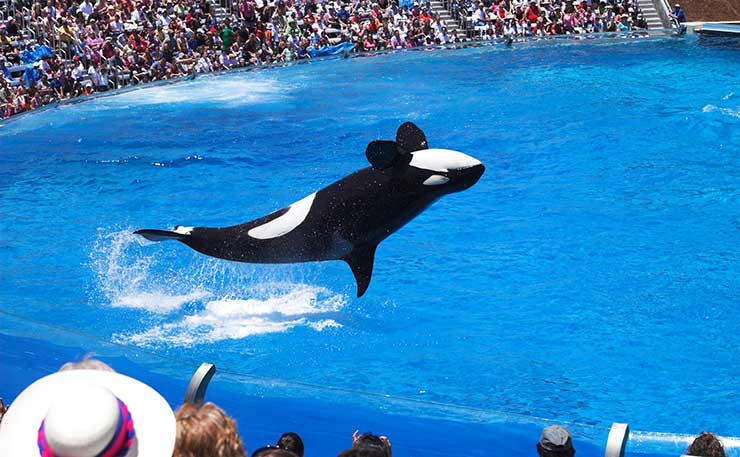There’s another side to the tourist corporation’s recent ‘act of conscience’, writes Jordan Sosnowski from Australia for Dolphins.
The latest news out of SeaWorld that will abandon breeding of Orcas in captivity is cause for some celebration. Yet I can’t help but think while animal activists the world over are busy patting themselves on the back, the villain is in broad daylight getting away with murder.
Maybe that’s too harsh. Is it murder to deliberately breed animals into an environment where you are know they will suffer and die early? Perhaps not murder in the traditional sense, but certainly a kind of premeditated torture.
In case you’re lost and wondering what all this “How to Make a Marine Murderer” talk is about, SeaWorld recently announced it is stopping theatrical shows and ending its captive orca breeding program.
Many in the animal welfare world have characterised the latest news as a win, but I think the Moet should stay on ice a little while longer. Because by feigning that it has “seen the light”, SeaWorld is selectively putting the truth on display like it would one of its animal exhibits.

Back in October the company was told by the California Coastal Commission if it wanted to go ahead with its planned $100 million expansion, it would have to stop its controversial captive breeding of orca. In response, SeaWorld announced it “must and will” challenge the ban.
SeaWorld stated the commission made “a dubious decision with no legal basis”. SeaWorld’s press release further stated “the Coastal Commission went way beyond its jurisdiction and authority when it banned breeding by killer whales at SeaWorld.”
Then, after all the hoo-ha, fast-forward five months and the ailing company announces it will end all theatrical shows and the orca breeding program. But not in response to the commission – apparently in response “to the attitudinal change that we helped create”.
SeaWorld CEO Joel Manby reasons that people come to SeaWorld to see orca and learn about them. Manby’s bizarre rationale is that once learning about these animals people realise they don’t belong in captivity, so SeaWorld is now “responding” to its customers by not bringing more orca into a world that doesn’t want to see them.
This just doesn’t sit right.

People go to SeaWorld for entertainment. They don’t go to learn about animals and it would not be in SeaWorld’s interests to teach them all that much about animals. If SeaWorld did tell its customers the facts about the animals in their care, no-one would visit the park at all.
And of course, the marine park chain knows this to be the case. SeaWorld may like to characterise itself as a marine animal rescue organisation but the fact is, it is a multi-billion dollar corporation.
The truth is that SeaWorld bought baby orca who had been stolen from their families. It artificially inseminated female orca when they were too young. The females had the babies and then couldn’t care for them, so the babies often died. If the babies did live, they were taken away from the mothers and sold off to other parks.
The company also allowed its trainers in the water with an orca who had already killed two people. The orca, Tilikum, eventually lashed out and killed a trainer, and then SeaWorld blamed the death on “trainer error”.
But it wouldn’t do SeaWorld any good to “inform and energise” its customers with these truths.
This newest change did not come about because SeaWorld “educated” people so much about orca and how they suffer in captivity.
This move came about because people learnt the truth, thanks in large part, to a documentary called Blackfish.
And also, because SeaWorld were completely backed into a corner by the California Coastal Commission. And probably most of all, because the company’s profits had dropped 84 per cent.
Announcing this change as a kind of “we’re listening to our customers” spin masks the truth. If SeaWorld were really listening to its customers, it would do something positive for the orca currently in its care. It would build sea pens where they could be retired. It would also stop its dolphin shows and its dolphin breeding programs, not just arbitrarily limit the ban to orca.
It’s not all bad – this change is a huge win for the generations of orca who will never be born into this torturous environment.
But for the 29 orca and countless dolphins who are confined across SeaWorld’s global marine park empire, we shouldn’t lose sight of the fact that it’s still just business as usual.
Donate To New Matilda
New Matilda is a small, independent media outlet. We survive through reader contributions, and never losing a lawsuit. If you got something from this article, giving something back helps us to continue speaking truth to power. Every little bit counts.





